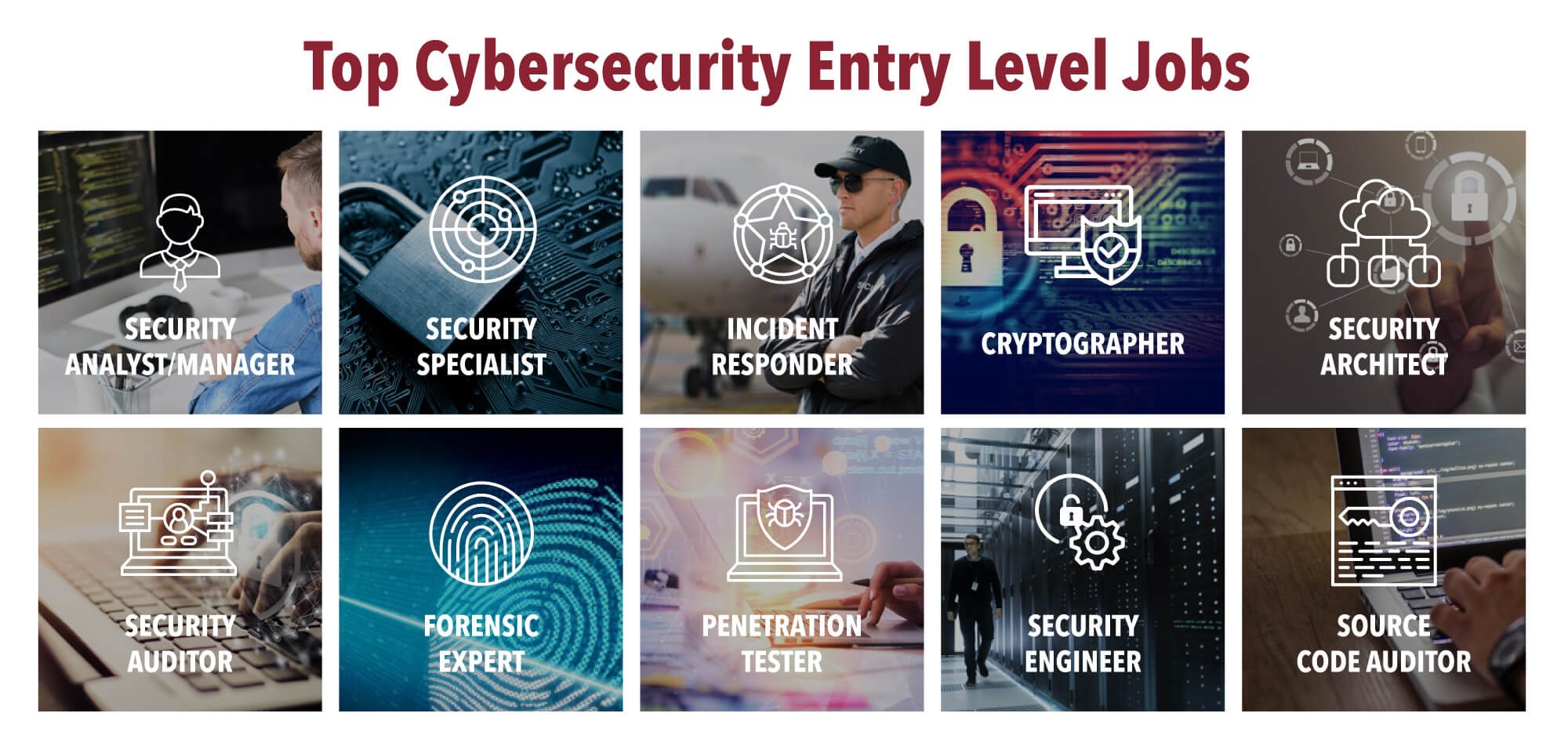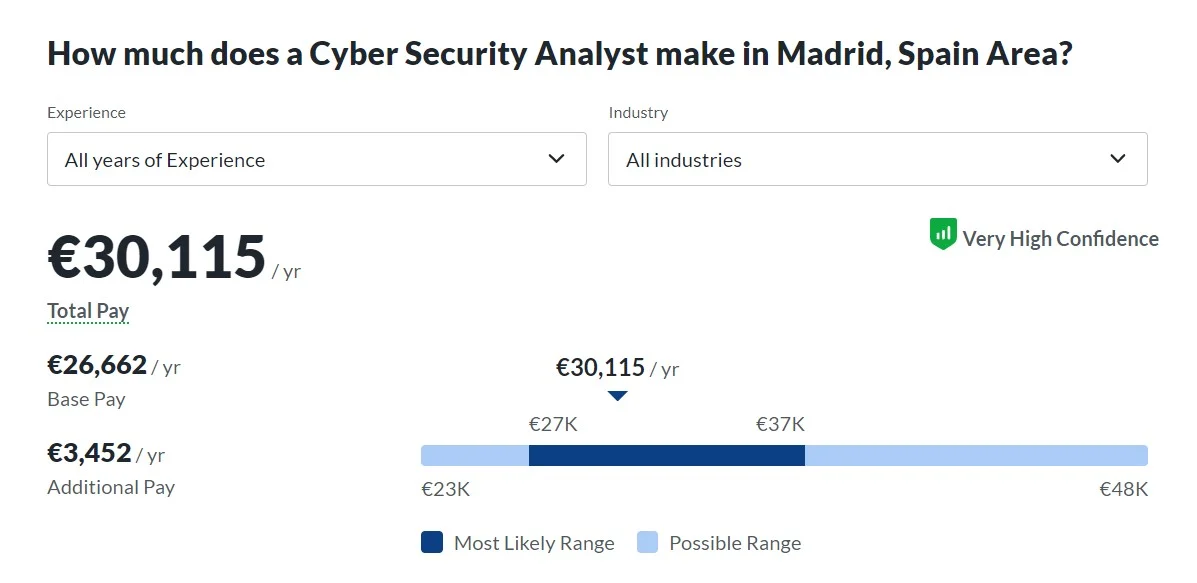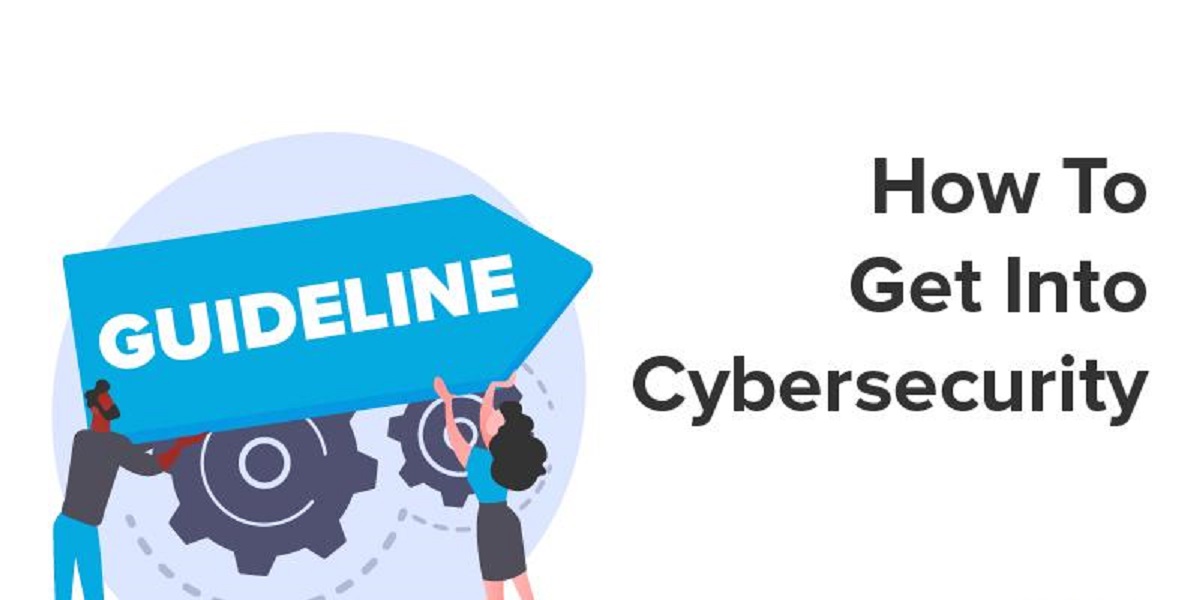Introduction
Cybersecurity is an increasingly critical field in today’s digital age, as individuals, businesses, and organizations face a growing threat of cyber attacks and data breaches. To combat these threats, cybersecurity professionals play a vital role in safeguarding sensitive data and ensuring the integrity, confidentiality, and availability of digital systems and networks.
The emergence of new technologies and the ever-evolving nature of cyber threats have created a high demand for skilled cybersecurity professionals. This has led to a wide range of job opportunities in the field, offering diverse career paths and the chance to make a significant impact on digital security.
Whether you’re a recent graduate looking to enter the field or a seasoned IT professional seeking a career transition, the world of cybersecurity offers numerous possibilities. From analyzing vulnerabilities to designing robust security systems and responding to incidents, cybersecurity jobs require a unique blend of technical expertise, problem-solving skills, and a proactive mindset.
In this article, we will explore some of the most sought-after cybersecurity jobs, providing an overview of the roles, responsibilities, and skills required for each. Whether you have a penchant for analyzing complex systems, conducting investigations, or developing security solutions, there is a cybersecurity career that may be the perfect fit for you.
So, if you’re ready to embark on an exciting journey into the realm of cybersecurity, let’s dive in and discover the diverse range of cybersecurity jobs that await you.
Cybersecurity Analyst
A cybersecurity analyst, also known as a security analyst or information security analyst, plays a crucial role in identifying and mitigating potential security risks and vulnerabilities within an organization’s digital infrastructure. These professionals are responsible for monitoring network systems, analyzing data, and implementing security measures to protect against cyber threats.
As a cybersecurity analyst, your daily tasks may include conducting risk assessments, investigating security incidents, and recommending security enhancements. You will also be responsible for analyzing security logs, identifying patterns or anomalies that may indicate potential threats, and responding promptly to mitigate any risks.
To excel in this role, you must possess a deep understanding of various cybersecurity frameworks, such as the NIST Cybersecurity Framework or ISO 27001. Additionally, you should have strong analytical and problem-solving skills to identify vulnerabilities and potential security gaps in systems.
Strong communication skills are also essential for a cybersecurity analyst, as you will need to effectively communicate findings and recommendations to non-technical colleagues and stakeholders. You must be able to articulate complex security concepts in a clear and concise manner.
Some key skills and qualifications for a cybersecurity analyst include:
- Knowledge of network and system security principles
- Proficiency in security tools and technologies, such as firewalls, intrusion detection systems, and vulnerability assessment tools
- Understanding of ethical hacking techniques and the ability to conduct penetration testing
- Experience in incident response and handling security incidents
- Understanding of compliance regulations and data protection laws
- Continuous learning and staying updated with the latest cybersecurity threats and trends
A career as a cybersecurity analyst offers a dynamic and challenging role, where you have the opportunity to make a significant impact on an organization’s security posture. With the increasing number of cyber threats, the demand for skilled cybersecurity analysts continues to rise. So, if you have a passion for protecting digital assets, analyzing security data, and staying one step ahead of cybercriminals, a career as a cybersecurity analyst may be the perfect fit for you.
Cybersecurity Engineer
A cybersecurity engineer is a professional responsible for designing and implementing secure computer systems, networks, and applications. They work closely with other IT teams and stakeholders to ensure that security measures are integrated into every aspect of an organization’s technology infrastructure.
As a cybersecurity engineer, your role involves developing, testing, and implementing security solutions to protect against cyber threats. You will collaborate with software developers, network administrators, and system engineers to ensure that security is a top priority in all stages of the development lifecycle.
This role requires a strong background in computer science, network security, and encryption technologies. You need to have a deep understanding of various security protocols, such as SSL/TLS, IPsec, and SSH. Additionally, hands-on experience with firewalls, intrusion detection systems, and vulnerability assessment tools is crucial.
One key responsibility of a cybersecurity engineer is conducting risk assessments and performing penetration testing to identify vulnerabilities in systems and processes. This involves utilizing ethical hacking techniques to simulate real-world cyber attacks and assess the effectiveness of security measures.
To succeed as a cybersecurity engineer, you should possess excellent problem-solving and analytical skills. You must be able to identify weaknesses in existing security systems and develop innovative solutions to address them. Additionally, staying up to date with the latest cybersecurity trends, emerging threats, and industry best practices is vital to ensure the effectiveness of your security measures.
Some essential skills and qualifications for a cybersecurity engineer include:
- Proficiency in programming languages such as Python, Java, or C++
- Strong knowledge of networking concepts and protocols
- Familiarity with cloud security and virtualization technologies
- Experience in secure software development practices
- Understanding of cryptography and encryption algorithms
- Ability to collaborate effectively with cross-functional teams
A career as a cybersecurity engineer offers exciting opportunities to create and implement robust security measures that protect valuable data and systems. With the increasing dependence on technology, the demand for skilled cybersecurity engineers continues to grow. So, if you have a passion for problem-solving, designing secure systems, and staying ahead of cyber threats, a career as a cybersecurity engineer may be the perfect fit for you.
Security Architect
A security architect is a cybersecurity professional responsible for designing and implementing secure systems and network architectures. They work closely with stakeholders and IT teams to develop comprehensive security strategies, ensuring that all aspects of an organization’s technology infrastructure are protected.
As a security architect, your role involves analyzing existing security systems and identifying potential vulnerabilities. You will develop and implement measures to mitigate risks, ensuring that security controls are integrated into the design and development of systems and applications from the start.
One of the main responsibilities of a security architect is to create and maintain the organization’s security architecture framework. This includes defining security policies, standards, and guidelines that align with industry best practices and regulatory requirements. You will also assess the effectiveness of security controls and recommend improvements or updates as necessary.
To excel in this role, you must have a strong technical background in information security and a deep understanding of networking and systems architecture. You should be well-versed in security frameworks and compliance regulations, such as ISO 27001, NIST, and GDPR.
Aside from technical expertise, strong communication and interpersonal skills are essential for a security architect. You will work collaboratively with various stakeholders and teams to ensure that security principles are integrated into the organization’s culture and processes. Effective communication is crucial when developing security requirements, presenting architectural recommendations, and providing guidance on security best practices to other teams.
Some key skills and qualifications for a security architect include:
- Comprehensive understanding of cybersecurity concepts and technologies
- Proficiency in risk assessment methodologies and threat modeling
- Experience with security architecture frameworks and design patterns
- Knowledge of identity and access management (IAM) systems
- Understanding of cloud security and virtualization technologies
- Ability to conduct security audits and assessments
Career opportunities as a security architect are abundant, especially as organizations prioritize cybersecurity in the face of evolving threats. As a security architect, you have the opportunity to shape and implement the security posture of an organization, ensuring the protection of valuable assets and data. So, if you have a passion for designing secure systems, assessing risks, and implementing robust security strategies, a career as a security architect may be the perfect fit for you.
Incident Responder
An incident responder is a cybersecurity professional responsible for identifying, investigating, and responding to security incidents within an organization. They play a critical role in minimizing the impact of a cyber attack or breach and restoring normal operations as quickly as possible.
As an incident responder, your primary objective is to identify and contain security incidents promptly. This involves analyzing and assessing the extent of the incident, determining the root cause, and implementing mitigation strategies to prevent further damage.
You will work closely with various teams, including IT, legal, and management, to coordinate incident response efforts. This may include gathering and preserving evidence, conducting forensic analysis, and collaborating with internal and external stakeholders to resolve the incident effectively.
Strong technical skills are crucial for an incident responder, as you will be dealing with complex systems and networks. You should have a deep understanding of various operating systems, network protocols, and security technologies. Knowledge of digital forensic tools and incident response frameworks, such as NIST 800-61 or the SANS Incident Response Process, is also essential.
In addition to technical expertise, incident responders must possess excellent analytical, problem-solving, and communication skills. The ability to think quickly, make sound decisions under pressure, and effectively communicate findings and recommendations to non-technical stakeholders is crucial in this role.
Some key skills and qualifications for an incident responder include:
- Experience in handling security incidents and conducting investigations
- Familiarity with cyber threat intelligence and risk management
- Knowledge of incident response tools, such as SIEM (Security Information and Event Management) solutions
- Understanding of malware analysis and reverse engineering
- Proficiency in performing memory and disk forensics
- Ability to develop and implement incident response plans
A career as an incident responder offers a challenging and rewarding role, where you are on the front lines of defending organizations against cyber threats. With the increasing frequency and sophistication of cyberattacks, the demand for skilled incident responders continues to grow. So, if you have a passion for investigating security incidents, mitigating risks, and ensuring the resilience of organizations in the face of cyber threats, a career as an incident responder may be the perfect fit for you.
Forensic Analyst
A forensic analyst, also known as a digital forensic analyst, is a cybersecurity professional responsible for investigating and analyzing digital evidence to uncover and prevent cybercrimes. They play a critical role in the field of cybersecurity by collecting and examining data from various sources to support legal investigations and incident response efforts.
As a forensic analyst, your primary focus is on analyzing digital artifacts, such as computer systems, hard drives, network logs, and mobile devices, to gather evidence that can be used in legal proceedings. You will utilize specialized forensic tools and techniques to extract and interpret data, reconstruct events, and identify potential security breaches.
One of the key responsibilities of a forensic analyst is maintaining the integrity and confidentiality of evidence throughout the investigation process. This involves following strict protocols and using forensic best practices to ensure that the evidence collected is admissible in court and meets legal requirements.
To excel in this role, you must have a strong understanding of computer systems, networks, and operating systems. You should be knowledgeable in file systems, data recovery techniques, and encryption. Additionally, familiarity with forensic tools, such as EnCase, FTK (Forensic Toolkit), or Autopsy, is essential for conducting thorough investigations.
Forensic analysts must possess strong analytical and problem-solving skills to identify patterns, anomalies, or potential security breaches in digital evidence. You will be responsible for documenting your findings, producing detailed reports, and presenting your analysis in a clear and concise manner to legal teams and other stakeholders.
Some key skills and qualifications for a forensic analyst include:
- Proficiency in digital forensic methodologies and techniques
- Knowledge of laws and regulations related to digital evidence and cybercrimes
- Experience in conducting forensic examinations and preserving chain of custody
- Understanding of network security and incident response
- Ability to stay updated with emerging forensic tools and techniques
- Excellent communication and presentation skills
A career as a forensic analyst offers a fascinating and challenging role, where you have the opportunity to make a significant impact in fighting cybercrimes and ensuring justice. With the rise in cybercrimes and the increasing reliance on digital evidence, the demand for skilled forensic analysts continues to grow. So, if you have a passion for investigating digital artifacts, uncovering hidden clues, and using technology to solve cybercrimes, a career as a forensic analyst may be the perfect fit for you.
Security Consultant
A security consultant is a cybersecurity professional who provides expert advice and guidance to organizations on improving their overall security posture. They assess the organization’s existing security measures, identify vulnerabilities, and develop strategies to enhance security and mitigate risks.
As a security consultant, your role involves working closely with clients to understand their unique security needs and requirements. You will conduct comprehensive security assessments, which may include penetration testing, vulnerability assessments, and risk assessments, to identify weaknesses in their systems and processes.
Based on your findings, you will develop customized security solutions, policies, and procedures tailored to the client’s specific needs. You will also provide recommendations on selecting and implementing security technologies, such as firewalls, intrusion detection systems, or security information and event management (SIEM) solutions.
Strong analytical and problem-solving skills are crucial for a security consultant, as you will be analyzing complex systems and making recommendations to address security gaps. You should have in-depth knowledge of industry best practices, regulatory requirements, and emerging cybersecurity threats.
Effective communication and interpersonal skills are also essential for a security consultant. You must be able to explain complex technical concepts to non-technical stakeholders and present your recommendations in a clear and concise manner. Building relationships and maintaining client trust is vital to succeed in this role.
Some key skills and qualifications for a security consultant include:
- Experience in conducting security assessments and audits
- Knowledge of security frameworks, such as ISO 27001 or NIST Cybersecurity Framework
- Understanding of compliance regulations and data privacy laws
- Proficiency in risk management methodologies
- Familiarity with cloud security and virtualization technologies
- Strong project management skills
A career as a security consultant offers a dynamic and challenging role, where you have the opportunity to work with diverse clients and industries. With the ever-increasing number of cyber threats and the need for comprehensive security strategies, the demand for skilled security consultants continues to grow. So, if you have a passion for analyzing security risks, developing customized solutions, and helping organizations strengthen their security defenses, a career as a security consultant may be the perfect fit for you.
Penetration Tester
A penetration tester, also known as an ethical hacker, is a cybersecurity professional who is hired to identify vulnerabilities in an organization’s systems and networks. They simulate real-world cyber attacks to assess the effectiveness of security measures and help organizations strengthen their defenses.
As a penetration tester, your role is to identify and exploit vulnerabilities in a controlled environment. You will conduct authorized security assessments, attempting to breach systems and gain access to sensitive data, all while following strict ethical guidelines.
Penetration testers utilize a wide range of tools and techniques to identify weaknesses in systems. This can include scanning for vulnerabilities, conducting network and application-level attacks, and social engineering methods to exploit human vulnerabilities. Through these activities, you aim to uncover the organization’s security weaknesses and provide actionable recommendations for improvement.
Strong technical skills are imperative for a penetration tester. You must have a deep understanding of various operating systems, programming languages, network protocols, and security technologies. Proficiency in tools such as Metasploit, Burp Suite, and Wireshark is essential for conducting effective penetration tests.
Analytical and problem-solving skills are vital when conducting penetration tests. You must be able to think creatively to identify potential attack vectors and adapt your methods based on the target environment. Attention to detail is crucial in documenting findings, reproducing exploit scenarios, and providing recommendations for remediation.
Effective communication skills are also essential as a penetration tester. You will work closely with clients and stakeholders to explain your findings, potential risks, and recommendations for improvement. Clear and concise reporting is key to conveying technical information to both technical and non-technical audiences.
Some key skills and qualifications for a penetration tester include:
- Knowledge of network and web application security
- Familiarity with common vulnerabilities and exploits
- Experience with penetration testing methodologies and frameworks, such as OWASP
- Understanding of ethical hacking principles and legal considerations
- Ability to document and present findings in a clear and concise manner
- Continuous learning and staying updated with the latest attack techniques and defense mechanisms
A career as a penetration tester offers an exciting and challenging role, where you have the opportunity to test the security of various systems and networks. With the ever-present threat of cyber attacks, organizations are increasingly investing in penetration testers to identify and address vulnerabilities. So, if you have a passion for finding weaknesses, solving puzzles, and staying one step ahead of adversaries, a career as a penetration tester may be the perfect fit for you.
Cryptographer
A cryptographer is a cybersecurity professional who specializes in the study and development of cryptographic algorithms and protocols. They play a crucial role in ensuring the confidentiality, integrity, and authenticity of sensitive information transmitted over digital networks.
As a cryptographer, your primary focus is on designing and analyzing cryptographic algorithms, encryption schemes, and cryptographic protocols. You develop mathematical models and algorithms to protect data from unauthorized access, tampering, and interception. You also conduct research to discover vulnerabilities in existing cryptographic systems and propose improvements to enhance their security.
Cryptographers work closely with other cybersecurity professionals, software developers, and network engineers to implement cryptographic techniques effectively. Whether it’s securing data at rest or in transit, you aim to provide secure and robust encryption mechanisms that resist attacks by adversaries.
Strong analytical and mathematical skills are essential for a cryptographer. You must have a deep understanding of number theory, algebraic structures, and computational complexity. Familiarity with cryptographic primitives like symmetric and asymmetric encryption, hashing algorithms, and digital signatures is necessary.
Effective communication skills are also crucial for a cryptographer. You often have to present complex cryptographic concepts and findings to non-technical stakeholders. You must be able to explain the rationale behind cryptographic choices and provide guidance on proper implementation and use of cryptographic mechanisms.
Some key skills and qualifications for a cryptographer include:
- Proficiency in cryptographic algorithms, protocols, and systems
- Knowledge of security engineering principles
- Familiarity with mathematical modeling and analysis
- Understanding of key management and secure key distribution mechanisms
- Ability to assess security assumptions and evaluate cryptographic strength
- Experience in cryptanalysis and vulnerability research
A career as a cryptographer offers an intellectually stimulating role, where you have the opportunity to contribute to the advancement of cryptographic techniques and help organizations protect sensitive information. With the growing reliance on secure communication and the need for strong encryption in various industries, the demand for skilled cryptographers continues to rise. So, if you have a passion for mathematics, problem-solving, and ensuring the confidentiality of digital information, a career as a cryptographer may be the perfect fit for you.
Security Researcher
A security researcher is a cybersecurity professional who focuses on discovering, analyzing, and uncovering vulnerabilities and weaknesses in computer systems, networks, and applications. They play a vital role in understanding and combatting the ever-evolving landscape of cyber threats and developing effective security solutions.
As a security researcher, your main objective is to actively explore and investigate potential security vulnerabilities. You conduct in-depth analysis and research on various systems and technologies to identify vulnerabilities and develop security patches or defenses.
You may use a combination of methods such as manual code review, reverse engineering, and automated vulnerability scanning tools to uncover vulnerabilities in software and systems. By identifying weaknesses, you provide valuable insights that can help organizations mitigate risks and strengthen their security posture.
Being a security researcher requires continuous learning and staying up to date with the latest attack techniques, security trends, and emerging technologies. You must possess a curious and creative mindset to think like a hacker and anticipate potential security flaws.
Strong technical skills and knowledge of programming languages are essential for a security researcher. Understanding various operating systems, network protocols, web application technologies, and security frameworks is crucial for conducting effective research and analysis.
Effective communication skills are also important for a security researcher. You must be able to document your findings, communicate technical concepts to both technical and non-technical audiences, and collaborate with other cybersecurity professionals to address discovered vulnerabilities.
Some key skills and qualifications for a security researcher include:
- Proficiency in programming languages like Python, Java, C++, or Ruby
- Knowledge of security principles and best practices
- Experience in vulnerability research and analysis
- Understanding of different types of cyber attacks and exploitation techniques
- Familiarity with tools and frameworks used in security research
- Ability to conduct in-depth research and analysis of security vulnerabilities
A career as a security researcher offers an exciting and ever-changing role, where you have the opportunity to uncover and address vulnerabilities that can impact the security of individuals, organizations, and even society as a whole. With the increasing complexity of cyber threats, the demand for skilled security researchers continues to grow. So, if you have a passion for discovering vulnerabilities, finding innovative solutions, and making a tangible difference in the world of cybersecurity, a career as a security researcher may be the perfect fit for you.
Security Auditor
A security auditor is a cybersecurity professional who evaluates and assesses an organization’s security measures to ensure compliance with industry standards and regulatory requirements. They play a crucial role in identifying vulnerabilities, assessing risks, and providing recommendations to enhance an organization’s overall security posture.
As a security auditor, your role involves conducting comprehensive assessments of an organization’s security controls, policies, and procedures. You review technical infrastructure, network architecture, and security protocols to identify potential weaknesses and areas of improvement. This includes analyzing access controls, data protection practices, and adherence to industry regulations.
You will work closely with various stakeholders, including IT teams, executives, and compliance officers, to understand the organization’s security requirements and develop audit plans. You conduct interviews, collect and analyze security documentation and logs, and perform testing and verification procedures to assess the organization’s compliance with security standards and guidelines.
To excel in this role, you must have a strong understanding of security frameworks, such as ISO 27001, NIST, or PCI DSS, as well as regulatory requirements specific to the industry. You should possess a deep knowledge of security best practices and be able to apply them to different environments and technologies.
Strong analytical and problem-solving skills are vital for a security auditor. You must be able to analyze complex systems, identify risks, and evaluate the effectiveness of security controls. Attention to detail and the ability to document findings and provide clear recommendations are crucial in this role.
Effective communication skills are also essential for a security auditor. You must be able to present audit findings to technical and non-technical stakeholders, clearly explaining security risks and providing practical recommendations for improvement. Building trust and maintaining open lines of communication are essential for fostering a collaborative security culture within the organization.
Some key skills and qualifications for a security auditor include:
- Experience in conducting security audits and assessments
- Knowledge of security frameworks and regulatory requirements
- Understanding of risk management methodologies
- Proficiency in security assessment tools and techniques
- Ability to analyze complex security systems and identify vulnerabilities
- Excellent documentation and report writing skills
A career as a security auditor offers a challenging and rewarding path, where you have the opportunity to ensure that organizations are meeting security standards and regulations. With the increasing need for compliance and risk management, the demand for skilled security auditors continues to grow. So, if you have a passion for evaluating security controls, identifying risks, and ensuring regulatory compliance, a career as a security auditor may be the perfect fit for you.
Conclusion
The field of cybersecurity offers a wide range of rewarding and dynamic career opportunities. From cybersecurity analysts and engineers to security architects and incident responders, each role plays a crucial part in protecting organizations from cyber threats and ensuring the integrity and confidentiality of digital systems.
Cybersecurity professionals require a unique combination of technical expertise, analytical skills, and a proactive mindset. They must continuously adapt to the ever-evolving landscape of cyber threats, staying updated with the latest attack techniques and defense mechanisms.
Whether you have a passion for analyzing vulnerabilities, developing secure systems, investigating security incidents, or conducting ethical hacking, there is a cybersecurity career path that suits your skills and interests.
The demand for skilled cybersecurity professionals continues to grow as organizations recognize the critical importance of strong security defenses. As technology becomes increasingly integrated into our lives, the need for professionals who can protect digital assets and respond effectively to threats becomes more significant.
Embarking on a career in cybersecurity offers not only job security and competitive salaries but also the opportunity to make a meaningful impact on digital security. By safeguarding sensitive information, combating cyber threats, and designing robust security measures, cybersecurity professionals contribute to the protection of individuals, businesses, and society as a whole.
Whether you are considering a career transition or just starting your professional journey, the diverse and dynamic field of cybersecurity provides endless possibilities. So, if you have a passion for technology, problem-solving, and ensuring the safety of digital systems and networks, take the leap and pursue a career in cybersecurity.

























